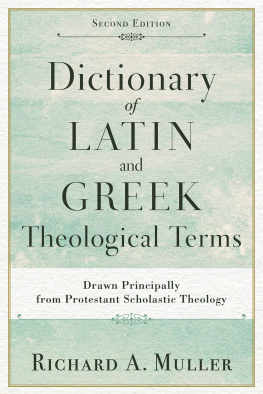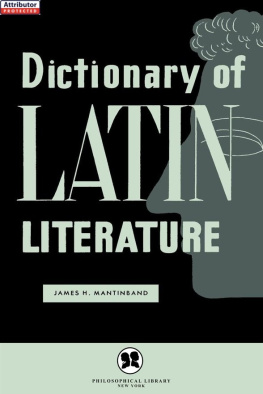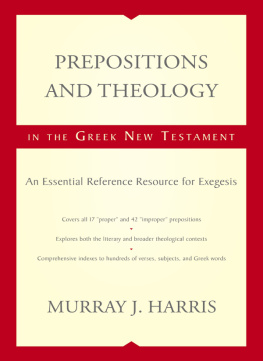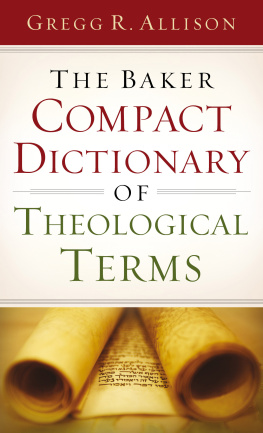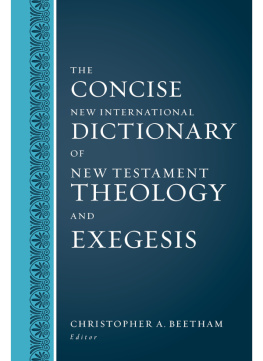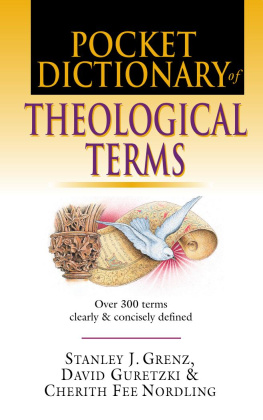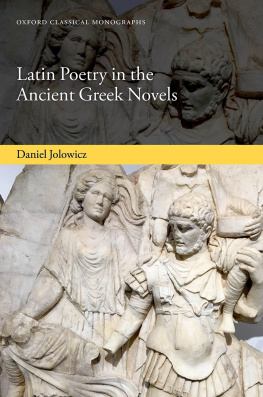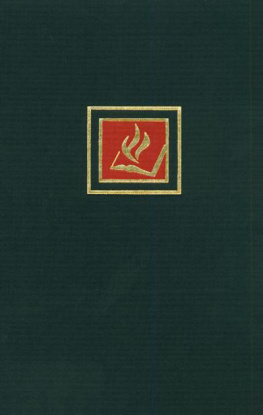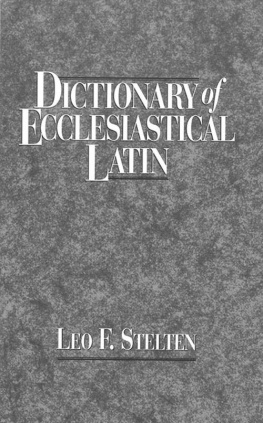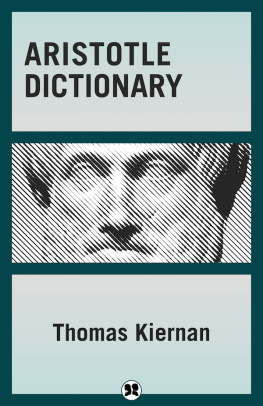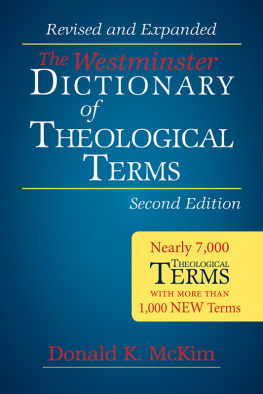1985, 2017 by Richard A. Muller
Published by Baker Academic
a division of Baker Publishing Group
P.O. Box 6287, Grand Rapids, MI 49516-6287
www.bakeracademic.com
Ebook edition created 2017
All rights reserved. No part of this publication may be reproduced, stored in a retrieval system, or transmitted in any form or by any meansfor example, electronic, photocopy, recordingwithout the prior written permission of the publisher. The only exception is brief quotations in printed reviews.
ISBN 978-1-4934-1208-2
Library of Congress Cataloging-in-Publication Data is on file at the Library of Congress, Washington, DC.
Unless otherwise indicated, all Scripture quotations are from the King James Version of the Bible.
To my parents,
Alfred and Kathryn Muller,
with love and gratitude
Contents
Preface to the Second Edition
More than three decades have passed since the appearance of the first edition of my Dictionary of Latin and Greek Theological Terms . Reception of the book throughout the years has been most gratifying.
In many ways the first edition of the dictionary charted my own introduction both to the intricacies and, underneath those intricacies, to the incredible clarity of Protestant scholastic thought. In the years intervening between that initial attempt at grasping the vocabulary of the older orthodoxy and this new edition of the book, I have continued to study the materials of the eras of the Reformation and orthodoxy, and I have found (not surprisingly) that the language of this highly variegated, philosophically attuned, and sometimes highly technical theology was far richer than I had originally imagined. A second edition allows me to offer in print an expanded point of entry into the terminology of Protestant orthodoxy, incorporating some of what I have learned over the years.
Few readers have complained about omissions, although various colleagues and students have noted terms and phrases that they would have liked to have seen included and defined, and several colleagues have indicated places in which definitions could be improved. My thanks in particular to David Sytsma, who carefully read through the entire text, pressed me to clarify passages, and made numerous suggestions for additions and elaborations. This new edition of the dictionary permits me to thank those colleagues by adding over one hundred terms and phrases; by editing, refining, and expanding other definitions; and by correcting typographical errors (and hopefully not inserting new ones).
Soli Deo gloria
Preface to the First Edition
The ability to work productively in the field of theology, as in any long-established discipline, rests in no small measure upon the mastery of vocabulary. The task is doubly difficult for English-speaking students. In the first place, the technical language of theology is still frequently in Greek or Latin. Not only is the precision of the original languages often lost in the transition to English, but many of the standard works in the field of theology continue to use the Greek and Latin terms, assuming that students have mastered the vocabulary. The problem is complicated, in the second place, by the fact that most of the contemporary lexical aids developed for English-speaking theological students are completely in English, including both the terms and their definitions. These considerations alone were enough inducement to lead one toward writing a brief dictionary of Greek and Latin theological terms.
There is one other issue, however, which makes the need for such a lexicon even more pressing: that issue concerns the Protestant heritage and its appropriation in and for the present, for the education of future ministers and teachers, and for the good of the church. Protestants have at their disposal a wealth of finely wrought theological systems, not only from the Reformers, but also from their successors, the theologians and teachers of the late sixteenth and seventeenth centuries. These latter writers took the ideas of the Reformers and, for the sake of preserving Protestantism from external attack and internal dissolution, forged a precise and detailed technical edifice of school-theology, which is now called Protestant orthodoxy or Protestant scholasticism. Not only did these orthodox or scholastic Protestants sustain the historical progress of the Reformation and transmit its theology to later generations, but they also clarified and developed the doctrines of the Reformers on such topics as the threefold office of Christ, the two states of Christ, the Lords Supper, and predestination.
The work of these theologians is well described by the two terms scholastic and orthodox. The former term refers primarily to method, the latter primarily to dogmatic or doctrinal intention. In the late sixteenth and the seventeenth centuries, both Reformed and Lutheran theologians adopted a highly technical and logical approach to theological system, according to which each theological topic, or locus, was divided into its component parts, and the parts were analyzed and then defined in careful propositional form. In addition, this highly technical approach sought to achieve precise definition by debate with adversaries and by use of the Christian tradition as a whole in arguing its doctrines. The form of theological system was adapted to a didactical and polemical model that could move from biblical definition to traditional development of doctrine, to debate with doctrinal adversaries past and present, to theological resolution of the problem. This method is rightly called scholastic both in view of its roots in medieval scholasticism and in view of its intention to provide an adequate technical theology for schoolsseminaries and universities. The goal of this method, the dogmatic or doctrinal intention of this theology, was to provide the church with right teaching, literally, orthodoxy.
I cannot here engage in the debate over the theology of the Protestant orthodox; some have called it dry, rigid, and a distortion of the Reformation; others, among them Karl Barth, have declared it to be a rich and abundant source of theological insight and have viewed it as a legitimate extension of the thought of the Reformers. What is undeniable is the technical expertise of the Protestant scholastics and their impact on modern Protestant theology, as evidenced in the works of Charles Hodge, Francis Pieper, Louis Berkhof, Otto Weber, and, of course, Karl Barth. The problem here is that the theology of the Protestant orthodox is only partially available to students. Standard resources that present orthodox or scholastic Protestantism, such as Heppes Reformed Dogmatics and Schmids Doctrinal Theology of the Evangelical Lutheran Church , give the technical terms, frequently without full definition and, particularly in the case of Heppe, in Latin or Greek without translation. The problem of language carries over into the excellent manuals of Pieper and Berkhof. It is my hope that this dictionary will make this foundational Protestant theology and its terms more accessible and ultimately provide students not only with an incentive to study this essential terminology, but also with a point of entry into Heppe and Schmid and into the great Latin systems of authors like Francis Turretin and Johann Wilhelm Baier.
The use of both Lutheran and Reformed sources in the compilation of this vocabulary has led to a considerable amount of comparison of doctrine in the longer, more substantive definitions, like that of communicatio idiomatum . My attempt in all such comparisons has been to draw out in brief the distinctive elements and the common ground of the two positions without making any judgment concerning which holds the better solution to a given doctrinal problem. I hope that the dictionary will be useful to Reformed and Lutheran alike, without prejudice to either, and that it will provide a useful point of entry into the vocabulary and the thought of the two great representative orthodoxies of the Protestant world.
Next page
